2023年中考英语一轮复习 第十一课时 八年级下册(Unit 8~Unit 10)课件(共40张PPT)
文档属性
| 名称 | 2023年中考英语一轮复习 第十一课时 八年级下册(Unit 8~Unit 10)课件(共40张PPT) |
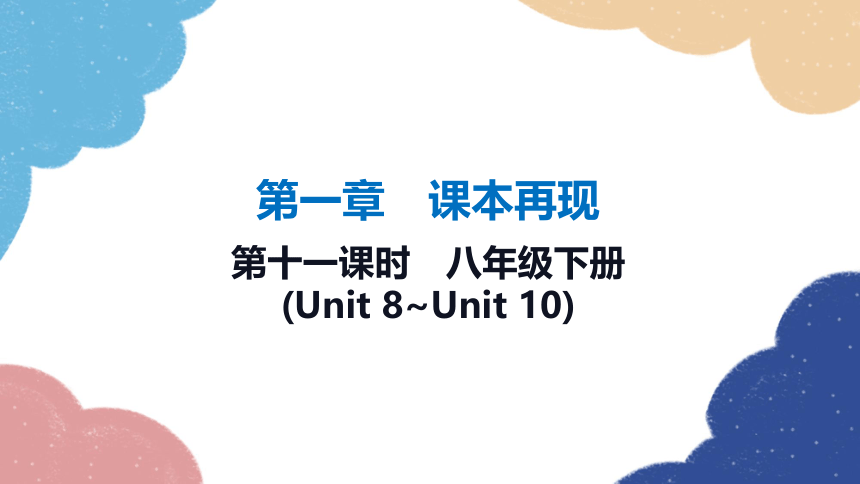
|
|
| 格式 | pptx | ||
| 文件大小 | 539.4KB | ||
| 资源类型 | 教案 | ||
| 版本资源 | 人教新目标(Go for it)版 | ||
| 科目 | 英语 | ||
| 更新时间 | 2023-05-26 00:00:00 | ||
图片预览

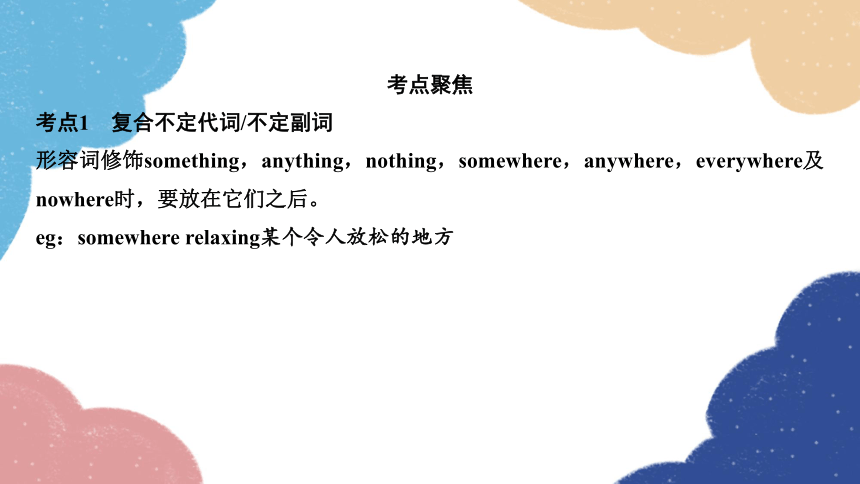
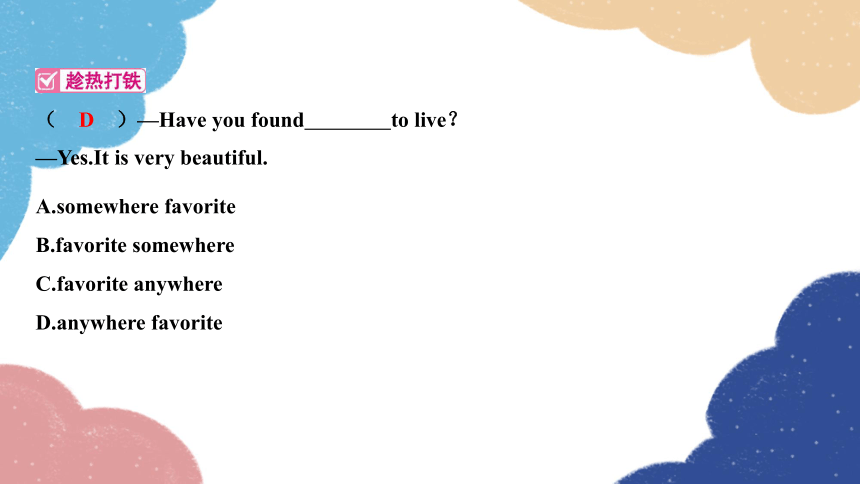
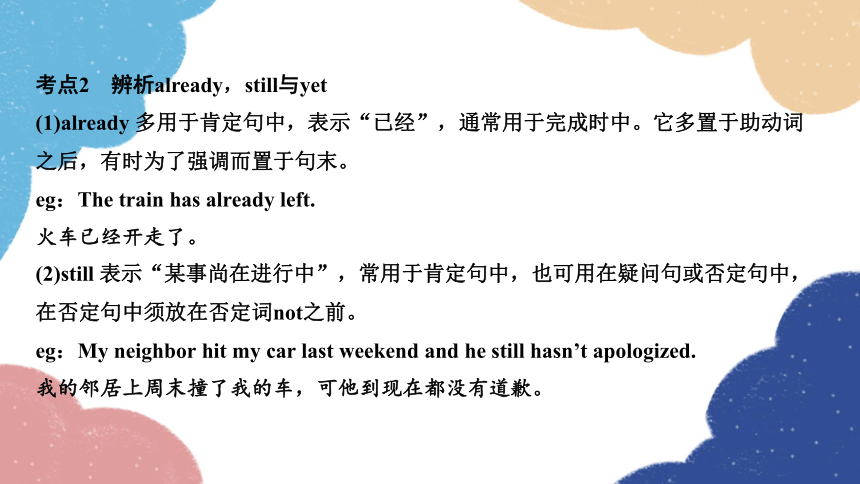
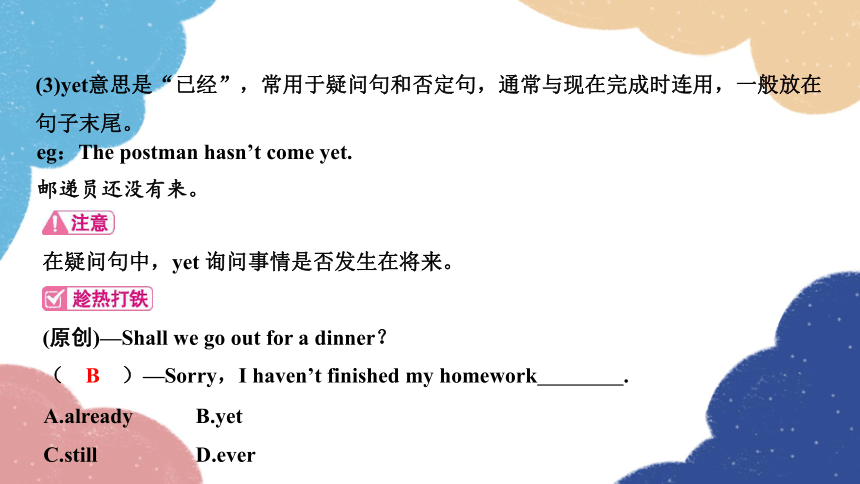

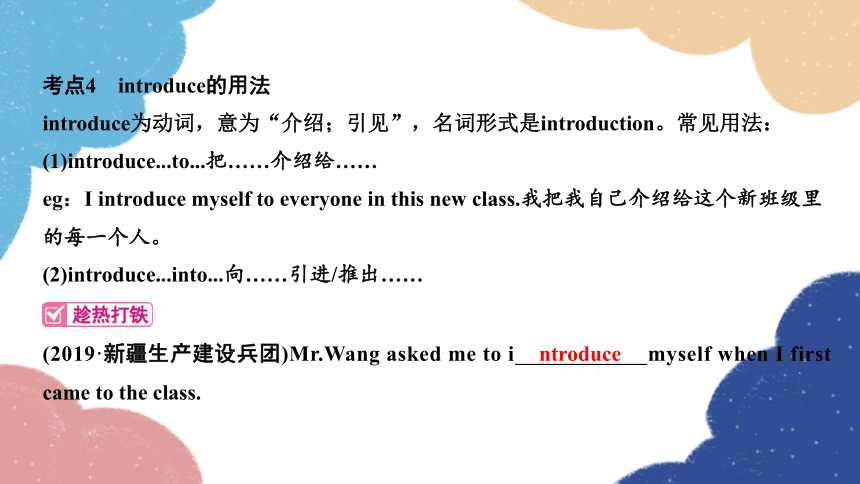
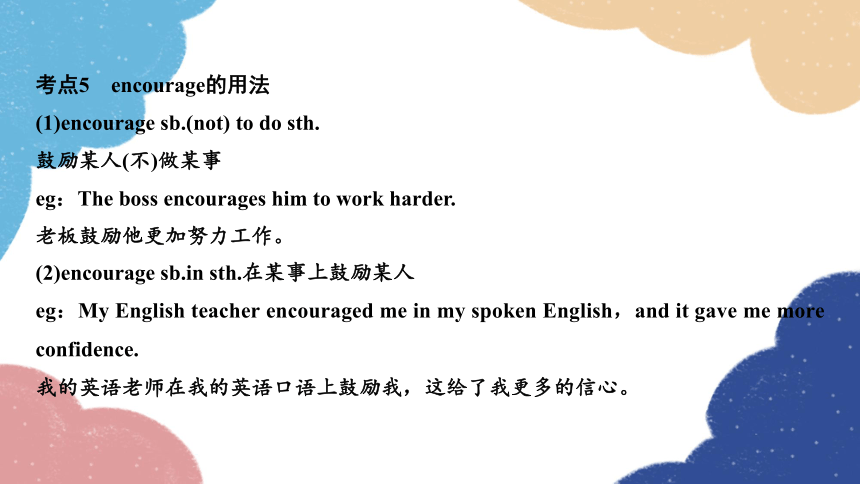
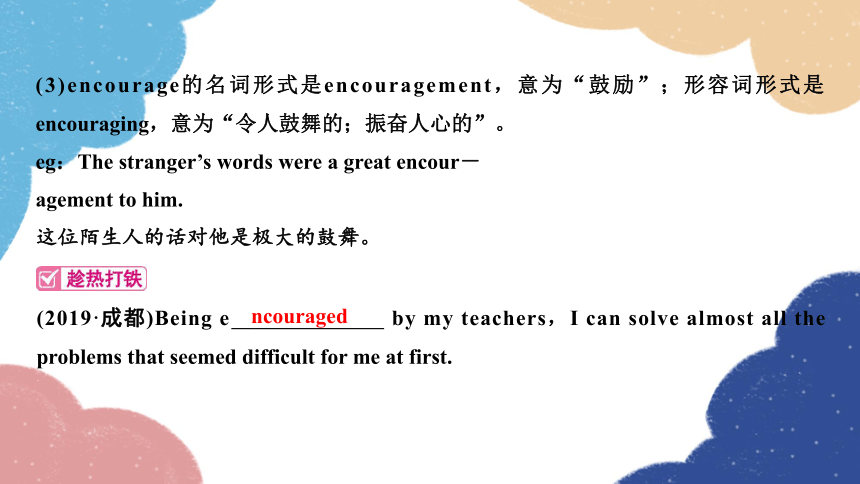
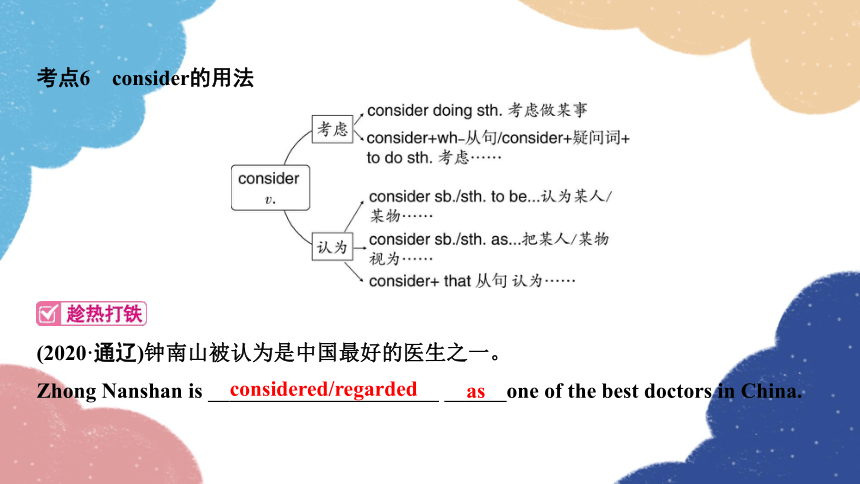
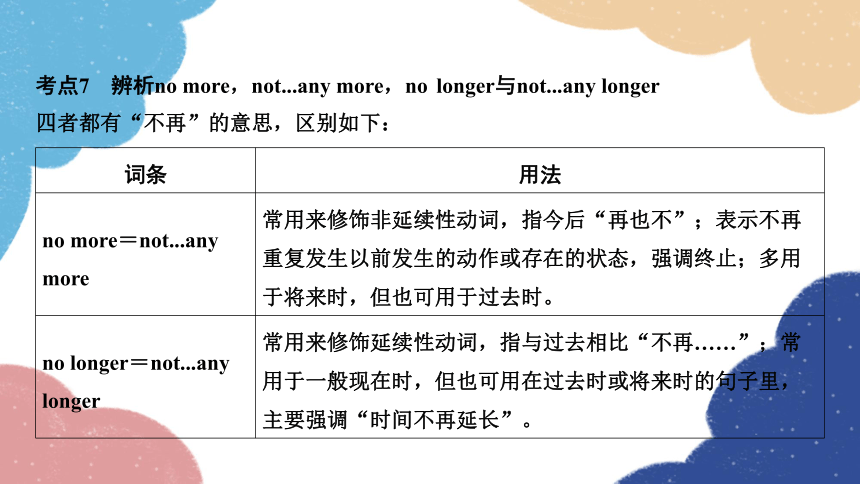
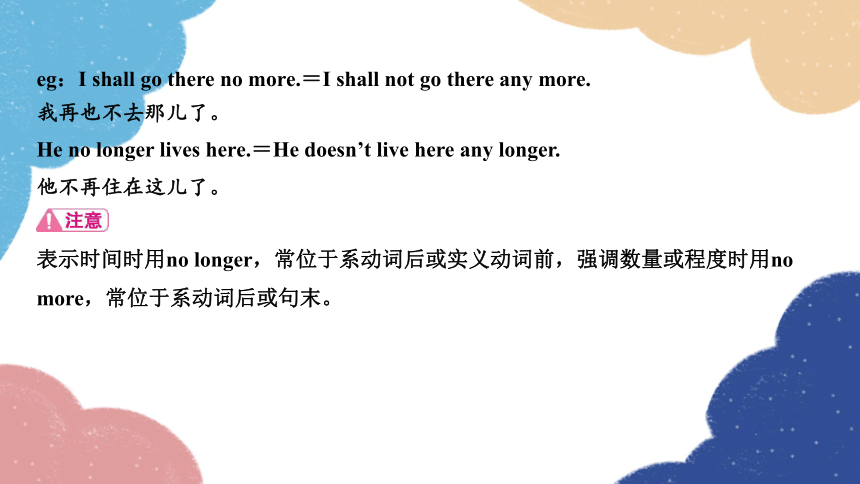
文档简介
(共40张PPT)
第十一课时 八年级下册
(Unit 8~Unit 10)
第一章 课本再现
考点聚焦
考点1 复合不定代词/不定副词
形容词修饰something,anything,nothing,somewhere,anywhere,everywhere及nowhere时,要放在它们之后。
eg:somewhere relaxing某个令人放松的地方
( D )—Have you found to live?
—Yes.It is very beautiful.
A.somewhere favorite
B.favorite somewhere
C.favorite anywhere
D.anywhere favorite
D
考点2 辨析already,still与yet
(1)already 多用于肯定句中,表示“已经”,通常用于完成时中。它多置于助动词之后,有时为了强调而置于句末。
eg:The train has already left.
火车已经开走了。
(2)still 表示“某事尚在进行中”,常用于肯定句中,也可用在疑问句或否定句中,在否定句中须放在否定词not之前。
eg:My neighbor hit my car last weekend and he still hasn’t apologized.
我的邻居上周末撞了我的车,可他到现在都没有道歉。
(3)yet意思是“已经”,常用于疑问句和否定句,通常与现在完成时连用,一般放在句子末尾。
eg:The postman hasn’t come yet.
邮递员还没有来。
在疑问句中,yet 询问事情是否发生在将来。
(原创)—Shall we go out for a dinner?
( B )—Sorry,I haven’t finished my homework .
A.already B.yet
C.still D.ever
B
考点3 succeed的用法
succeed为动词,意为“成功;实现目标”。succeed in doing sth.意为“成功做某事”。
eg:Without doubt,he will succeed in achieving his dream.
毫无疑问,他将会成功实现他的梦想。
succeed的名词形式为success,形容词形式为successful,副词形式为successfully。
(2019·泰州改编)To break the silence,I told a joke and soon the conversation went on successfully (成功地).
successfully
考点4 introduce的用法
introduce为动词,意为“介绍;引见”,名词形式是introduction。常见用法:
(1)introduce...to...把……介绍给……
eg:I introduce myself to everyone in this new class.我把我自己介绍给这个新班级里的每一个人。
(2)introduce...into...向……引进/推出……
(2019·新疆生产建设兵团)Mr.Wang asked me to i ntroduce myself when I first came to the class.
ntroduce
考点5 encourage的用法
(1)encourage sb.(not) to do sth.
鼓励某人(不)做某事
eg:The boss encourages him to work harder.
老板鼓励他更加努力工作。
(2)encourage sb.in sth.在某事上鼓励某人
eg:My English teacher encouraged me in my spoken English,and it gave me more confidence.
我的英语老师在我的英语口语上鼓励我,这给了我更多的信心。
(3)encourage的名词形式是encouragement,意为“鼓励”;形容词形式是encouraging,意为“令人鼓舞的;振奋人心的”。
eg:The stranger’s words were a great encour-
agement to him.
这位陌生人的话对他是极大的鼓舞。
(2019·成都)Being e ncouraged by my teachers,I can solve almost all the problems that seemed difficult for me at first.
ncouraged
考点6 consider的用法
(2020·通辽)钟南山被认为是中国最好的医生之一。
Zhong Nanshan is considered/regarded as one of the best doctors in China.
considered/regarded
as
考点7 辨析no more,not...any more,no longer与not...any longer
四者都有“不再”的意思,区别如下:
词条 用法
no more=not...any more 常用来修饰非延续性动词,指今后“再也不”;表示不再重复发生以前发生的动作或存在的状态,强调终止;多用于将来时,但也可用于过去时。
no longer=not...any longer 常用来修饰延续性动词,指与过去相比“不再……”;常用于一般现在时,但也可用在过去时或将来时的句子里,主要强调“时间不再延长”。
我再也不去那儿了。
He no longer lives here.=He doesn’t live here any longer.
他不再住在这儿了。
eg:I shall go there no more.=I shall not go there any more.
表示时间时用no longer,常位于系动词后或实义动词前,强调数量或程度时用no more,常位于系动词后或句末。
重点语法
语法点 现在完成时
1.定义
现在完成时表示到现在为止已经完成或仍在持续的动作、状态,强调其对现在的影响或造成的结果。
(1)过去开始,现在持续。
eg:I have studied English since I was six years old.我从6岁就开始学英语了。
(表示从6岁开始学,现在仍然在学)
(2)过去完成,影响现在。
eg:I have lost the key,so I have to stay outside.
我丢了钥匙,所以我不得不待在外面。(丢了钥匙对现在造成了“不得不待在外面”的影响)
2.结构
(1)肯定句式:have/has+动词过去分词
该句式中的have或has是助动词,has用于第三人称单数,其他人称一律用have。
(2)否定句式:have/has not+动词过去分词
(3)疑问句式:把助动词have或has提到主语之前
3.过去分词的变化规则
(1)规则变化:
①直接加-ed。
eg:visited asked played stayed
②以不发音的字母e结尾的单词直接加-d。
eg:liked lived moved
③重读闭音节结尾的单词先双写最后一个字母,再加-ed。
eg:stopped dropped planned preferred
④“辅音字母+y”结尾的单词先变y为i,再加-ed。
eg:carried worried tried cried
(2)不规则变化见课本P136和P137表格。
4.现在完成时的关键词
(1)ever,never,already(肯定句),yet(否定句或疑问句),just,before。
(2)for+一段时间
(3)in the past/last+一段时间
eg:in the past ten years在过去的10年里
(5)so far到目前为止
(6)recently最近,近来
5.辨析have been to,have been in与have gone to
(1)have been to表示“去过某地”(现在不在那里)。
eg:I have been to Paris.Now I am staying in Zhuhai.
我去过巴黎。现在我待在珠海。
(2)have been in表示“一直待在某地”,后接地点。
eg:I came to Zhuhai in 2015.I have been in
Zhuhai for eight years already.2015年我来到了珠海。我已经在珠海待了8年了。
(3)have gone to表示“去了某地”(还未回来)。
eg:—Where is your father?
你爸爸在哪儿?
—He isn’t in.He has gone to Shenzhen on business.
他不在家。他去深圳出差了。
6.for,since与how long的用法
(1)for和since都可以回答由how long引导的问句。
(2)for,since与how long这三者出现时,谓语动词要使用延续性动词。
①延续性动词表示经验、经历;而瞬间性动词表示行为的结果,不能与一段时间连用。
eg:I’ve known him since then.
我从那时起就认识他了。(表经历)
Julia has kept the book for three days.
Julia已经借了这本书3天了。
He has completed the work.
他已完成了那项工作。(表结果)
Julia has borrowed the book.
Julia已经借了那本书。
②非延续性动词转化为延续性动词
eg:buy→have
borrow/lend→keep/have
come back→be back
come here→be here
go there→be there
leave→be away (from...)
join→be in/be a member of...
die→be dead
become→be
begin/start→be on
finish→be over
open(v.打开)→be open(adj.开着的)
close(v.关闭)→be closed(adj.关着的)
get to/reach/arrive at/in→be in
marry/get married→be married
7.It is+一段时间+since引导的时间状语从句.
这一固定句型意为“自……以来多长时间了”,使用该句型时,从句必须用一般过去时。
eg:It is five years since he joined the army.
自从他参军以来已经5年了。
8.现在完成时与一般过去时的区别
现在完成时强调做过的事情对现在造成的影响,而一般过去时只是强调动作做完了,与现在无关。
eg:I have lost the ticket,so I can’t go to the concert.
我丢了票,所以我不能去听音乐会了。
I lost the ticket yesterday.
我昨天把票弄丢了。
( B )①Both his parents look sad.Maybe they what’s happened to him.
A.knew B.have known
C.must know D.will know
( B )②He has been to Shanghai,has he?
A.already B.never
C.ever D.still
( C )③Have you met Mr.Li ?
A.just B.ago
C.before D.a moment ago
B
B
C
备考演练
单项选择
( D )1.(2019·北京)Our school life a lot since 2017.We have more activities now.
A.changes B.changed
C.will change D.has changed
D
( C )2.(2018·白银)—I can’t find my English textbook.
—Is it possible that you it at home?
A.lost B.saw C.left D.gave
( D )3.There is in his home.
A.other nothing B.nothing other
C.else nothing D.nothing else
C
D
( C )4.The number of the students in our grade about and of them are girls.
A.are;six hundreds;two thirds
B.is;six hundred;two third
C.is;six hundred;two thirds
D.are;six hundred;two third
( C )5.— have you stayed in this city?
—For more than 10 years.
A.How far B.How soon
C.How long D.How old
C
C
( A )6.(2022·云南)—How was your camping in the countryside last weekend?
—It was great.We a tent by the lake and had much fun.
A.put up B.put off C.put on D.put in
( C )7.(2022·曲靖一模)We English for nearly three years.We are comfortably speaking it now.
A.learn B.learned
C.have learned D.were learning
A
C
( C )8.(2020 ·福建)On video,Doctor Zhong Nanshan teenagers to study hard in the first lesson of this term.
A.allowed B.trained
C.encouraged
C
感受中考
( C )1.(2022·重庆B卷)The new year is coming.Teachers encourage us new hobbies.
A.develop B.developing
C.to develop D.developed
( B )2.(2020·天水)—The Whites have London.
—Oh,really?I have never there before.
A.been to;gone B.gone to;been
C.been to;gone to D.gone to;been to
C
B
( B )3.(2020·武威)I the guitar ever since I was 8 years old.
A.played B.haveplayed
C.am playing D.will play
( D )4.(2018·天水)—When will A Bite of China Ⅲ begin tonight?
—It for ten minutes.
A.will begin B.has begun
C.will be on D.has beenon
( C )5.(2018·白银)—Is dinner ready?
—Not .
A.already B.just C.yet D.ever
B
D
C
( A )6.(2020·天水)—I want to buy for my grandpa to make him happy.
—That’s a good idea.
A.something special B.special something
C.anything special D.special anything
7.(2021·兰州)Sam has already saved (save) 85 yuan for his favorite model car.
8.(2019·天水)The old couple married thirty years ago.(改为同义句)
The old couple have been married for thirty years.
A
saved
been
married
中考新题型
一、单项选择
( A )1.(2021·武威)—I believe this is the best movie of the year.
—Well, .Anyway,the ending is OK.
A.I don’t like it actually
B.that may not be a good idea
C.that’s a good idea
D.I think you’re right
A
( B )2.(2021·武威)—Would you mind telling me how to start this machine?
— .It’s very easy.Do it like this.
A.Yes,of course
B.No,not at all
C.No,thanks
D.Yes,you are right
( B ) 3.(2022·哈尔滨)Which pair of the words with the underlined letters has the same sound?
C.loud double
B
A
A.hand camp
B.drive thin
( D )4.(2019·兰州)Which word goes with the sound /sne k/?
A.snack B.smile
C.state D.snake
D
二、选择方框中的单词或短语填空(有两项多余)
thirsty,products,called in,
spread,moved,came in,won
1.China is good at making high-technology products that people can buy everywhere.
2.A doctor was called in to examine the king yesterday evening.
3.The piece of music which was played on the erhu especially moved me.
4.Some children are so full of energy and thirsty for knowledge.
5.Jenny recently won a prize from the Help Save Our Planet Society.
products
called in
moved
thirsty
won
三、阅读理解
Three years ago,I went on a vacation in Paris,France.One day,I went to a restaurant to have lunch,but there were no more free tables there.Then an old woman said,“You can sit with me.”I thanked her and sat down with the kind woman.
After the lunch,she asked me how I would spend the vacation in Paris.I told her I would take a taxi to go out,although it was a little expensive.
“My dear,don’t use any more taxis,”said the woman.“I’m retired(退休的) and I can drive you to any place you want.”
I told her I couldn’t trouble her too much,but she disagreed and asked me where I was staying and the next morning she came to my hotel.She drove me to the Eiffel Tower and then left after staying with me for some time.At the end of the day,she came back to take me back to my hotel.I gave her money,but she refused.
That wonderful woman made my short vacation in Paris great.I will never forget her.
根据短文内容判断正误,正确的写A,错误的写B。
1.The writer didn’t have lunch because there were no free tables in the restaurant.( B )
2.The old woman would like to drive the writer anywhere she wanted to go.( A )
3.The old woman visited the Eiffel Tower with the writer.( A )
4.The old woman got some money after she drove the writer to the Eiffel Tower.( B )
5.The writer will never forget the old woman because of her kindness.( A )
B
A
A
B
A
第十一课时 八年级下册
(Unit 8~Unit 10)
第一章 课本再现
考点聚焦
考点1 复合不定代词/不定副词
形容词修饰something,anything,nothing,somewhere,anywhere,everywhere及nowhere时,要放在它们之后。
eg:somewhere relaxing某个令人放松的地方
( D )—Have you found to live?
—Yes.It is very beautiful.
A.somewhere favorite
B.favorite somewhere
C.favorite anywhere
D.anywhere favorite
D
考点2 辨析already,still与yet
(1)already 多用于肯定句中,表示“已经”,通常用于完成时中。它多置于助动词之后,有时为了强调而置于句末。
eg:The train has already left.
火车已经开走了。
(2)still 表示“某事尚在进行中”,常用于肯定句中,也可用在疑问句或否定句中,在否定句中须放在否定词not之前。
eg:My neighbor hit my car last weekend and he still hasn’t apologized.
我的邻居上周末撞了我的车,可他到现在都没有道歉。
(3)yet意思是“已经”,常用于疑问句和否定句,通常与现在完成时连用,一般放在句子末尾。
eg:The postman hasn’t come yet.
邮递员还没有来。
在疑问句中,yet 询问事情是否发生在将来。
(原创)—Shall we go out for a dinner?
( B )—Sorry,I haven’t finished my homework .
A.already B.yet
C.still D.ever
B
考点3 succeed的用法
succeed为动词,意为“成功;实现目标”。succeed in doing sth.意为“成功做某事”。
eg:Without doubt,he will succeed in achieving his dream.
毫无疑问,他将会成功实现他的梦想。
succeed的名词形式为success,形容词形式为successful,副词形式为successfully。
(2019·泰州改编)To break the silence,I told a joke and soon the conversation went on successfully (成功地).
successfully
考点4 introduce的用法
introduce为动词,意为“介绍;引见”,名词形式是introduction。常见用法:
(1)introduce...to...把……介绍给……
eg:I introduce myself to everyone in this new class.我把我自己介绍给这个新班级里的每一个人。
(2)introduce...into...向……引进/推出……
(2019·新疆生产建设兵团)Mr.Wang asked me to i ntroduce myself when I first came to the class.
ntroduce
考点5 encourage的用法
(1)encourage sb.(not) to do sth.
鼓励某人(不)做某事
eg:The boss encourages him to work harder.
老板鼓励他更加努力工作。
(2)encourage sb.in sth.在某事上鼓励某人
eg:My English teacher encouraged me in my spoken English,and it gave me more confidence.
我的英语老师在我的英语口语上鼓励我,这给了我更多的信心。
(3)encourage的名词形式是encouragement,意为“鼓励”;形容词形式是encouraging,意为“令人鼓舞的;振奋人心的”。
eg:The stranger’s words were a great encour-
agement to him.
这位陌生人的话对他是极大的鼓舞。
(2019·成都)Being e ncouraged by my teachers,I can solve almost all the problems that seemed difficult for me at first.
ncouraged
考点6 consider的用法
(2020·通辽)钟南山被认为是中国最好的医生之一。
Zhong Nanshan is considered/regarded as one of the best doctors in China.
considered/regarded
as
考点7 辨析no more,not...any more,no longer与not...any longer
四者都有“不再”的意思,区别如下:
词条 用法
no more=not...any more 常用来修饰非延续性动词,指今后“再也不”;表示不再重复发生以前发生的动作或存在的状态,强调终止;多用于将来时,但也可用于过去时。
no longer=not...any longer 常用来修饰延续性动词,指与过去相比“不再……”;常用于一般现在时,但也可用在过去时或将来时的句子里,主要强调“时间不再延长”。
我再也不去那儿了。
He no longer lives here.=He doesn’t live here any longer.
他不再住在这儿了。
eg:I shall go there no more.=I shall not go there any more.
表示时间时用no longer,常位于系动词后或实义动词前,强调数量或程度时用no more,常位于系动词后或句末。
重点语法
语法点 现在完成时
1.定义
现在完成时表示到现在为止已经完成或仍在持续的动作、状态,强调其对现在的影响或造成的结果。
(1)过去开始,现在持续。
eg:I have studied English since I was six years old.我从6岁就开始学英语了。
(表示从6岁开始学,现在仍然在学)
(2)过去完成,影响现在。
eg:I have lost the key,so I have to stay outside.
我丢了钥匙,所以我不得不待在外面。(丢了钥匙对现在造成了“不得不待在外面”的影响)
2.结构
(1)肯定句式:have/has+动词过去分词
该句式中的have或has是助动词,has用于第三人称单数,其他人称一律用have。
(2)否定句式:have/has not+动词过去分词
(3)疑问句式:把助动词have或has提到主语之前
3.过去分词的变化规则
(1)规则变化:
①直接加-ed。
eg:visited asked played stayed
②以不发音的字母e结尾的单词直接加-d。
eg:liked lived moved
③重读闭音节结尾的单词先双写最后一个字母,再加-ed。
eg:stopped dropped planned preferred
④“辅音字母+y”结尾的单词先变y为i,再加-ed。
eg:carried worried tried cried
(2)不规则变化见课本P136和P137表格。
4.现在完成时的关键词
(1)ever,never,already(肯定句),yet(否定句或疑问句),just,before。
(2)for+一段时间
(3)in the past/last+一段时间
eg:in the past ten years在过去的10年里
(5)so far到目前为止
(6)recently最近,近来
5.辨析have been to,have been in与have gone to
(1)have been to表示“去过某地”(现在不在那里)。
eg:I have been to Paris.Now I am staying in Zhuhai.
我去过巴黎。现在我待在珠海。
(2)have been in表示“一直待在某地”,后接地点。
eg:I came to Zhuhai in 2015.I have been in
Zhuhai for eight years already.2015年我来到了珠海。我已经在珠海待了8年了。
(3)have gone to表示“去了某地”(还未回来)。
eg:—Where is your father?
你爸爸在哪儿?
—He isn’t in.He has gone to Shenzhen on business.
他不在家。他去深圳出差了。
6.for,since与how long的用法
(1)for和since都可以回答由how long引导的问句。
(2)for,since与how long这三者出现时,谓语动词要使用延续性动词。
①延续性动词表示经验、经历;而瞬间性动词表示行为的结果,不能与一段时间连用。
eg:I’ve known him since then.
我从那时起就认识他了。(表经历)
Julia has kept the book for three days.
Julia已经借了这本书3天了。
He has completed the work.
他已完成了那项工作。(表结果)
Julia has borrowed the book.
Julia已经借了那本书。
②非延续性动词转化为延续性动词
eg:buy→have
borrow/lend→keep/have
come back→be back
come here→be here
go there→be there
leave→be away (from...)
join→be in/be a member of...
die→be dead
become→be
begin/start→be on
finish→be over
open(v.打开)→be open(adj.开着的)
close(v.关闭)→be closed(adj.关着的)
get to/reach/arrive at/in→be in
marry/get married→be married
7.It is+一段时间+since引导的时间状语从句.
这一固定句型意为“自……以来多长时间了”,使用该句型时,从句必须用一般过去时。
eg:It is five years since he joined the army.
自从他参军以来已经5年了。
8.现在完成时与一般过去时的区别
现在完成时强调做过的事情对现在造成的影响,而一般过去时只是强调动作做完了,与现在无关。
eg:I have lost the ticket,so I can’t go to the concert.
我丢了票,所以我不能去听音乐会了。
I lost the ticket yesterday.
我昨天把票弄丢了。
( B )①Both his parents look sad.Maybe they what’s happened to him.
A.knew B.have known
C.must know D.will know
( B )②He has been to Shanghai,has he?
A.already B.never
C.ever D.still
( C )③Have you met Mr.Li ?
A.just B.ago
C.before D.a moment ago
B
B
C
备考演练
单项选择
( D )1.(2019·北京)Our school life a lot since 2017.We have more activities now.
A.changes B.changed
C.will change D.has changed
D
( C )2.(2018·白银)—I can’t find my English textbook.
—Is it possible that you it at home?
A.lost B.saw C.left D.gave
( D )3.There is in his home.
A.other nothing B.nothing other
C.else nothing D.nothing else
C
D
( C )4.The number of the students in our grade about and of them are girls.
A.are;six hundreds;two thirds
B.is;six hundred;two third
C.is;six hundred;two thirds
D.are;six hundred;two third
( C )5.— have you stayed in this city?
—For more than 10 years.
A.How far B.How soon
C.How long D.How old
C
C
( A )6.(2022·云南)—How was your camping in the countryside last weekend?
—It was great.We a tent by the lake and had much fun.
A.put up B.put off C.put on D.put in
( C )7.(2022·曲靖一模)We English for nearly three years.We are comfortably speaking it now.
A.learn B.learned
C.have learned D.were learning
A
C
( C )8.(2020 ·福建)On video,Doctor Zhong Nanshan teenagers to study hard in the first lesson of this term.
A.allowed B.trained
C.encouraged
C
感受中考
( C )1.(2022·重庆B卷)The new year is coming.Teachers encourage us new hobbies.
A.develop B.developing
C.to develop D.developed
( B )2.(2020·天水)—The Whites have London.
—Oh,really?I have never there before.
A.been to;gone B.gone to;been
C.been to;gone to D.gone to;been to
C
B
( B )3.(2020·武威)I the guitar ever since I was 8 years old.
A.played B.haveplayed
C.am playing D.will play
( D )4.(2018·天水)—When will A Bite of China Ⅲ begin tonight?
—It for ten minutes.
A.will begin B.has begun
C.will be on D.has beenon
( C )5.(2018·白银)—Is dinner ready?
—Not .
A.already B.just C.yet D.ever
B
D
C
( A )6.(2020·天水)—I want to buy for my grandpa to make him happy.
—That’s a good idea.
A.something special B.special something
C.anything special D.special anything
7.(2021·兰州)Sam has already saved (save) 85 yuan for his favorite model car.
8.(2019·天水)The old couple married thirty years ago.(改为同义句)
The old couple have been married for thirty years.
A
saved
been
married
中考新题型
一、单项选择
( A )1.(2021·武威)—I believe this is the best movie of the year.
—Well, .Anyway,the ending is OK.
A.I don’t like it actually
B.that may not be a good idea
C.that’s a good idea
D.I think you’re right
A
( B )2.(2021·武威)—Would you mind telling me how to start this machine?
— .It’s very easy.Do it like this.
A.Yes,of course
B.No,not at all
C.No,thanks
D.Yes,you are right
( B ) 3.(2022·哈尔滨)Which pair of the words with the underlined letters has the same sound?
C.loud double
B
A
A.hand camp
B.drive thin
( D )4.(2019·兰州)Which word goes with the sound /sne k/?
A.snack B.smile
C.state D.snake
D
二、选择方框中的单词或短语填空(有两项多余)
thirsty,products,called in,
spread,moved,came in,won
1.China is good at making high-technology products that people can buy everywhere.
2.A doctor was called in to examine the king yesterday evening.
3.The piece of music which was played on the erhu especially moved me.
4.Some children are so full of energy and thirsty for knowledge.
5.Jenny recently won a prize from the Help Save Our Planet Society.
products
called in
moved
thirsty
won
三、阅读理解
Three years ago,I went on a vacation in Paris,France.One day,I went to a restaurant to have lunch,but there were no more free tables there.Then an old woman said,“You can sit with me.”I thanked her and sat down with the kind woman.
After the lunch,she asked me how I would spend the vacation in Paris.I told her I would take a taxi to go out,although it was a little expensive.
“My dear,don’t use any more taxis,”said the woman.“I’m retired(退休的) and I can drive you to any place you want.”
I told her I couldn’t trouble her too much,but she disagreed and asked me where I was staying and the next morning she came to my hotel.She drove me to the Eiffel Tower and then left after staying with me for some time.At the end of the day,she came back to take me back to my hotel.I gave her money,but she refused.
That wonderful woman made my short vacation in Paris great.I will never forget her.
根据短文内容判断正误,正确的写A,错误的写B。
1.The writer didn’t have lunch because there were no free tables in the restaurant.( B )
2.The old woman would like to drive the writer anywhere she wanted to go.( A )
3.The old woman visited the Eiffel Tower with the writer.( A )
4.The old woman got some money after she drove the writer to the Eiffel Tower.( B )
5.The writer will never forget the old woman because of her kindness.( A )
B
A
A
B
A
